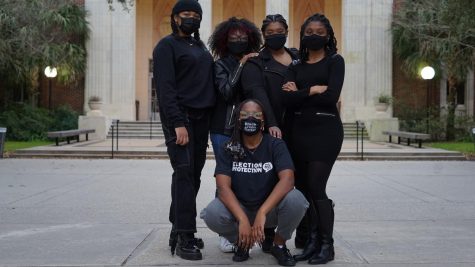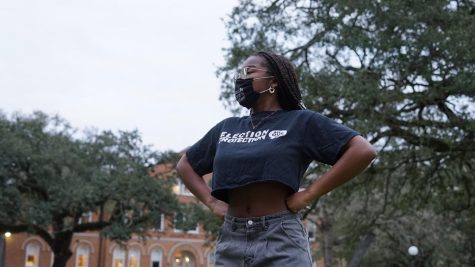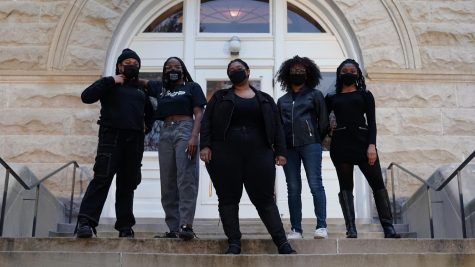OPINION | On the Black experience at Tulane during COVID-19

As we near a post-COVID-19 society, it is more important than ever to evaluate the intersection between COVID-19 disparities and race. Talking about the intersection of the COVID-19 pandemic and race is important when we think about the city that Tulane is located in, as difficult and uncomfortable that can be for all of us. The Black community at Tulane has been struggling during this time as Tulane has become a hot-spot of cases since students returned to campus. While Black students must take action and be extra cautious due to increased risk, many of Tulane’s students maintain a relaxed attitude when it comes to COVID-19 restrictions. Addressing the issues and concerns of the Black students and faculty at Tulane must be prioritized for the sake of both Tulane and the New Orleans community at large.
As unfortunate as it is, the racial gap between Black and white Americans goes beyond skin tone — by many measures, Black Americans suffer worse health outcomes than white Americans. As systemic racism is directly correlated to more adverse health disparities, “health inequality actually is a ‘Black and white issue.”’ African Americans suffer a disproportionate burden of disease. This is especially true in Louisiana during the COVID-19 pandemic, where more than 70% of COVID-19 related deaths are Black patients, while African Americans make up only 32% of the population. Moreover, the risk factors impacting the large amount of fatal Black coronavirus cases — high blood pressure, diabetes and heart diseases — all are linked to historic and current systemic racism. Although Tulane has made an effort to help after receiving a grant to address the hardest hit communities in New Orleans, these statistics are still unacceptable. Many of us chose to come here because of the city of New Orleans which would not exist without the large contributions of its Black populace.
When thinking about increased health risks within the Black community, it is also important to note the service learning program that has always seemed bittersweet. For students who are a part of both the native New Orleans and Tulane communities, this situation has been even tougher with the pandemic. New Orleans’ view of Tulane students during this time has been lackluster as the cumulative number of COVID-19 cases continues to rise in the Tulane bubble.
Students don’t seem to understand that New Orleans is a majority-Black community. Participating in courses that are supposed to help the community while disobeying COVID-19 safety regulations negatively impacts the people students are trying to help. Paige Magee, a native New Orleanian and Tulane student brought up an interesting point: New Orleans will be apprehensive of working with Tulane students in the future if this unsafe behavior continues. “I hear many [of] my family [members] saying ‘COVID is spreading so much in our city because of those white children in them sororities and fraternities that like to throw them parties’… or ‘Paige I hope you being safe cause I see [on the] news them white children actin a fool’… when it is time for Service Learning to be back in person, I am not sure that the [New Orleans] Natives would want the additional help.” Tulane students have to realize the negative impact their actions can have on New Orleans. As Tulanians, we have a responsibility to make a bigger impact.

The Black community within Tulane is suffering as well. For any freshman, the transition to college and on-campus living is one that is extremely challenging. For the class of 2024, especially the Black students, this holds especially true.
“With a lot of people that I don’t know, a lot of people have told me that I look intimidating or unapproachable, or overall I feel like a lot of people just look past me,” freshman Anaya Rodgers said regarding how mask wearing, although a necessity, has impacted her own interactions with her non-Black peers.
The Black freshman pandemic experience and transition is one that is unique and isolating as well. Connecting with Black peers on campus has also been a challenge, Rodgers said. “A lot of our time in [Black Student Union] has been reduced because of the COVID restrictions, so everything we’ve done has been virtual and in effect of virtual activities and zoom fatigue a lot of people don’t actually attend the events, so when I go to the BSU events that are online I’m seeing a lot of the same people that I already know and the people that I’ve met.”
When asked about how her own personal transition would differ in a pandemic free world, Rodgers said, “I think that I would have been able to find the Black Tulane student community a lot more easily and been able to form relationships with people outside of my class which probably would have made me feel more comfortable and transition into the university more easier.” Because of COVID-19, Black freshmen like Rodgers are finding it hard to socialize. In a campus that is already so racially polarized, this development may be detrimental to the Black Tulane freshman experience.
The COVID-19 virus has also impacted how Tulane’s Black faculty teaches and interacts with their fellow colleagues and students. Andrea Boyles, a professor in the department of sociology and Africana studies, explained how before the virus, life as a young Black woman already had many difficulties like sexism and racism. “Teaching can be a little difficult. … It takes a little more creativity in terms of making connections with students in ways that don’t further distance or detach them from you … if that makes sense,” Boyles said. “And then doing that, while also trying to navigate the fact that Black people, generally speaking, are facing overlapping social issues broadly. So while COVID is unfolding, I am reminded of and teaching about other factors that significantly impact the Black community, and I’m not separate from that.”

John Proctor, an assistant professor in the department of theatre and dance, expressed the hardships of connecting with his students. “I don’t see my students’ faces anymore,” Proctor said. “I can’t see their reactions. I’m not exactly sure if I’m getting through to them … Sometimes I don’t know whether I’m connecting with my students or not.” The bittersweet safety restrictions have kept the faculty protected from the virus, but has robbed them of building relationships at the same time.
This is a difficult time for everyone, but it is especially difficult for the Black community at Tulane and the Black community as a whole. Tulane students have to do a better job in understanding that their actions affect more than just themselves and that going to school in New Orleans means caring about New Orleans as a whole, not just parties and bars.
Your donation will support the student journalists of Tulane University. Your contribution will allow us to purchase equipment and cover our annual website hosting costs.


